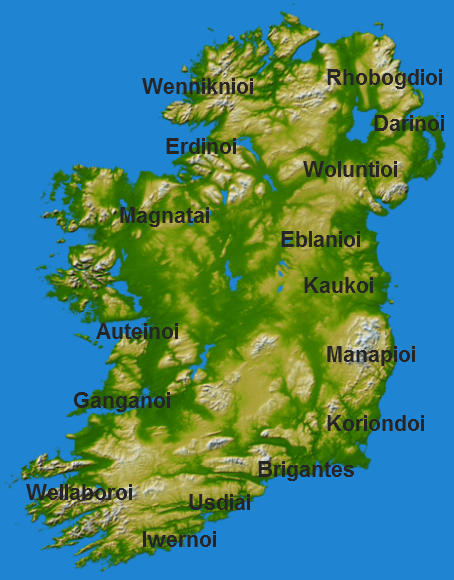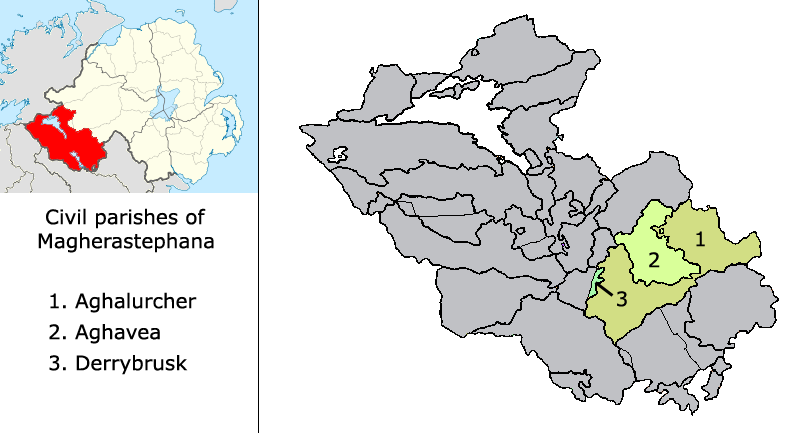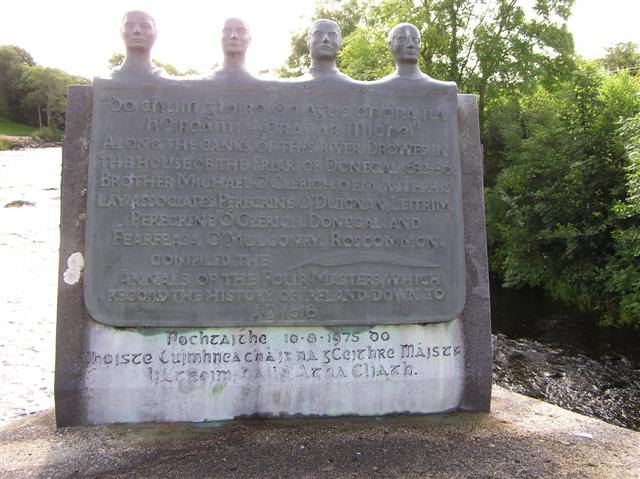|
Bryan Maguire, 1st Baron Of Enniskillen
Bryan Roe Maguire, 1st Baron of Enniskillen (; 1589–1633), was a Gaelic Irish nobleman from Magherastephana, County Fermanagh. He was the son of Connor Roe Maguire, nicknamed "the Queen's Maguire" or "the Traitor Maguire" for his support of Elizabeth I's campaign in the Nine Years' War. Bryan was knighted on 2 February 1626 and made "Lord Maguire, Baron of Enniskillen" by James I on 3 March 1627. The ''Annals of the Four Masters'' was compiled under his patronage. His sons Connor Maguire, 2nd Baron and Colonel Rory Maguire died as officers of Confederate Ireland Confederate Ireland, also referred to as the Irish Catholic Confederation, was a period of Irish Catholic self-government between 1642 and 1649, during the Eleven Years' War. Formed by Catholic aristocrats, landed gentry, clergy and military .... References 1589 births 1633 deaths People from County Fermanagh Barons in the Peerage of Ireland Peers of Ireland created by Charles I Members of the ... [...More Info...] [...Related Items...] OR: [Wikipedia] [Google] [Baidu] |
Gaelic Irish
The Gaels ( ; ga, Na Gaeil ; gd, Na Gàidheil ; gv, Ny Gaeil ) are an ethnolinguistic group native to Ireland, Scotland and the Isle of Man in the British Isles. They are associated with the Gaelic languages: a branch of the Celtic languages comprising Irish, Manx and Scottish Gaelic. Gaelic language and culture originated in Ireland, extending to Dál Riata in western Scotland. In antiquity, the Gaels traded with the Roman Empire and also raided Roman Britain. In the Middle Ages, Gaelic culture became dominant throughout the rest of Scotland and the Isle of Man. There was also some Gaelic settlement in Wales, as well as cultural influence through Celtic Christianity. In the Viking Age, small numbers of Vikings raided and settled in Gaelic lands, becoming the Norse-Gaels. In the 9th century, Dál Riata and Pictland merged to form the Gaelic Kingdom of Alba. Meanwhile, Gaelic Ireland was made up of several kingdoms, with a High King often claiming lordship over them. ... [...More Info...] [...Related Items...] OR: [Wikipedia] [Google] [Baidu] |
Rory Maguire (soldier)
Colonel Rory Maguire (1619 – 13 November 1648) was an Irish politician and soldier. He was a leading instigator of the Irish Rebellion of 1641 and subsequently participated in the Irish Confederate Wars as a senior Confederate commander. Biography Maguire was the second son of Bryan Maguire, 1st Baron of Enniskillen and Rose, daughter of Art MacBaron O'Neill. In 1639, Maguire was elected as the Member of Parliament for County Fermanagh in the Irish House of Commons. He received a commission in Charles I of England's Irish army in 1640. In May 1640 he married Deborah, widow of Sir Leonard Blennerhassett and daughter of Sir Henry Mervyn. Their son was the Jacobite politician, Roger Maguire, who later claimed the title Baron Maguire. Through his marriage to Deborah, Maguire became the owner of Crevenish Castle. Alongside his older brother, Connor Maguire, he was a prime mover in the conspiracy which led to the outbreak of rebellion in Ireland on 23 October 1641. Maguire was tasked ... [...More Info...] [...Related Items...] OR: [Wikipedia] [Google] [Baidu] |
Barons In The Peerage Of Ireland
Baron is a rank of nobility or title of honour, often Hereditary title, hereditary, in various European countries, either current or historical. The female equivalent is baroness. Typically, the title denotes an aristocrat who ranks higher than a lord or knight, but lower than a viscount or count. Often, barons hold their fief – their lands and income – directly from the monarch. Barons are less often the vassals of other nobles. In many kingdoms, they were entitled to wear a smaller form of a crown called a ''coronet''. The term originates from the Late Latin, Latin term , via Old French. The use of the title ''baron'' came to England via the Norman Conquest of 1066, then the Normans brought the title to Scotland and Italy. It later spread to Scandinavia and Slavic lands. Etymology The word '':wikt:baron, baron'' comes from the Old French , from a Late Latin "man; servant, soldier, mercenary" (so used in Salic law; Alemannic law has in the same sense). The scholar ... [...More Info...] [...Related Items...] OR: [Wikipedia] [Google] [Baidu] |
People From County Fermanagh
A person ( : people) is a being that has certain capacities or attributes such as reason, morality, consciousness or self-consciousness, and being a part of a culturally established form of social relations such as kinship, ownership of property, or legal responsibility. The defining features of personhood and, consequently, what makes a person count as a person, differ widely among cultures and contexts. In addition to the question of personhood, of what makes a being count as a person to begin with, there are further questions about personal identity and self: both about what makes any particular person that particular person instead of another, and about what makes a person at one time the same person as they were or will be at another time despite any intervening changes. The plural form "people" is often used to refer to an entire nation or ethnic group (as in "a people"), and this was the original meaning of the word; it subsequently acquired its use as a plural form of per ... [...More Info...] [...Related Items...] OR: [Wikipedia] [Google] [Baidu] |
1633 Deaths
Events January–March * January 20 – Galileo Galilei, having been summoned to Rome on orders of Pope Urban VIII, leaves for Florence for his journey. His carriage is halted at Ponte a Centino at the border of Tuscany, where he is quarantined for 22 days because of an outbreak of the plague. * February 6 – The formal coronation of Władysław IV Vasa as King of Poland at the cathedral in Krakow. He had been elected as king on November 8. * February 9 – The Duchy of Hesse-Cassel captures Dorsten from the Electorate of Cologne without resistance. * February 13 ** Galileo Galilei arrives in Rome for his trial before the Inquisition. ** Fire engines are used for the first time in England in order to control and extinguish a fire that breaks out at London Bridge, but not before 43 houses are destroyed. "Fires, Great", in ''The Insurance Cyclopeadia: Being an Historical Treasury of Events and Circumstances Connected with the Origin and Progress of Ins ... [...More Info...] [...Related Items...] OR: [Wikipedia] [Google] [Baidu] |
1589 Births
Events January–June * War of the Three Henrys: In France, the Catholic League is in rebellion against King Henry III, in revenge for his murder of Henry I, Duke of Guise in December 1588. The King makes peace with his old rival, the Huguenot Henry of Navarre, his designated successor, and together they besiege Paris. * January 26 – Job is elected as the first Patriarch of Moscow and All Russia. * February 26 – Valkendorfs Kollegium is founded in Copenhagen, Denmark. * April 13 – An English Armada, led by Sir Francis Drake and Sir John Norreys, and largely financed by private investors, sets sail to attack the Iberian Peninsula's Atlantic coast, but fails to achieve any naval advantage. July–December * August 1 – King Henry III of France is stabbed by the fanatical Dominican friar Jacques Clément (who is immediately killed). * August 2 – Following the death of Henry III of France, his army is thrown into confusion ... [...More Info...] [...Related Items...] OR: [Wikipedia] [Google] [Baidu] |
Baron Of Enniskillen
Baron Maguire, of Enniskillen, was a title in the Peerage of Ireland. It was created on 3 March 1628 for Bryan Maguire by Charles I Charles I may refer to: Kings and emperors * Charlemagne (742–814), numbered Charles I in the lists of Holy Roman Emperors and French kings * Charles I of Anjou (1226–1285), also king of Albania, Jerusalem, Naples and Sicily * Charles I of .... On 10 February 1645, the second baron was attainted and the barony forfeited. Barons Maguire (1628) * Bryan Maguire, 1st Baron Maguire (–1633) * Connor Maguire, 2nd Baron Maguire (–1645) References * {{DEFAULTSORT:Maguire 1628 establishments in Ireland[...More Info...] [...Related Items...] OR: [Wikipedia] [Google] [Baidu] |
Confederate Ireland
Confederate Ireland, also referred to as the Irish Catholic Confederation, was a period of Irish Catholic self-government between 1642 and 1649, during the Eleven Years' War. Formed by Catholic aristocrats, landed gentry, clergy and military leaders after the Irish Rebellion of 1641, the Confederates controlled up to two thirds of Ireland from their base in Kilkenny; hence it is sometimes called the "Confederation of Kilkenny". The Confederates included Catholics of Gaelic and Anglo-Norman descent. They wanted an end to anti-Catholic discrimination within the Kingdom of Ireland and greater Irish self-governance; many also wanted to roll back the plantations of Ireland. Most Confederates professed loyalty to Charles I of England in the belief they could reach a lasting settlement in return for helping defeat his opponents in the Wars of the Three Kingdoms. [...More Info...] [...Related Items...] OR: [Wikipedia] [Google] [Baidu] |
Connor Maguire, 2nd Baron Of Enniskillen
Connor (or Cornelius) Maguire, 2nd Baron of Enniskillen (Irish ''Conchobhar Mag Uidhir''; 1616 – 1645) was an Irish nobleman from Ulster who took part in the Irish Rebellion of 1641. He was executed for high treason. Background He was born in County Fermanagh, the son of Sir Bryan Maguire who was created a peer on account of the family loyalty to the English crown. The family was granted land in their traditional power base of Fermanagh by James I, as part of the Ulster Plantation. His mother was an O'Neill, which brought a connection to the leading family of Ulster. He is said to have been partly educated at Magdalen College, Oxford, but did not matriculate in the university. His brother, Rory Maguire, married into a leading planter family, and sat for Fermanagh in the 1640 Parliament. Politics He succeeded to the peerage in 1634, and attended the parliament which met in Dublin on 10 March 1640. In Dublin, during the session in February 1641, he was recruited by rebel Rory ... [...More Info...] [...Related Items...] OR: [Wikipedia] [Google] [Baidu] |
Magherastephana
Magherastephana is a barony in County Fermanagh, Northern Ireland. To its south-west lies Upper Lough Erne, and it is bordered by five other baronies: Tirkennedy to the west; Knockninny to the south-west; and Coole to the south; Clankelly to the south-east; and Clogher to the north-west. History The barony of Magherastephana is first recorded in 1520 in the Annals of the Four Masters, as ''Machaire Stefanach'', and in Annals of Ulster in 1530 as ''(an) Machaire Steabhanach''. The origins of the name however are unknown. Irish scholar John O'Donovan alleged that it was named after a ''Steafán'' (Stephen) who was the son of ''Odhar'', the progenitor of the Maguires, and a figure from the 10th century. The problem however is that the name Stephen didn't arrive into Ireland until the 12th century when the Normans brought it in with them, and in which case came in the form of ''Estievne'', which became Gaelicised as ''Stiabhna'', ''Sdíomnha'', ''Stiana'', ''Steimhín'' and ''Slei ... [...More Info...] [...Related Items...] OR: [Wikipedia] [Google] [Baidu] |
Patronage
Patronage is the support, encouragement, privilege, or financial aid that an organization or individual bestows on another. In the history of art, arts patronage refers to the support that kings, popes, and the wealthy have provided to artists such as musicians, painters, and sculptors. It can also refer to the right of bestowing offices or Benefice, church benefices, the business given to a store by a regular customer, and the patron saint, guardianship of saints. The word "patron" derives from the la, patronus ("patron"), one who gives benefits to his clients (see Patronage in ancient Rome). In some countries the term is used to describe political patronage or patronal politics, which is the use of state resources to reward individuals for their electoral support. Some patronage systems are legal, as in the Canadian tradition of the Prime Minister to appoint Senate of Canada, senators and the heads of a number of commissions and agencies; in many cases, these appointments go to ... [...More Info...] [...Related Items...] OR: [Wikipedia] [Google] [Baidu] |
Annals Of The Four Masters
The ''Annals of the Kingdom of Ireland'' ( ga, Annála Ríoghachta Éireann) or the ''Annals of the Four Masters'' (''Annála na gCeithre Máistrí'') are chronicles of medieval Irish history. The entries span from the Deluge, dated as 2,242 years after creation to AD 1616. Publication delay Due to the criticisms by 17th century Irish historian Tuileagna Ó Maol Chonaire, the text was not published in the lifetimes of any of the participants. Text The annals are mainly a compilation of earlier annals, although there is some original work. They were compiled between 1632 and 1636, allegedly in a cottage beside the ruins of Donegal Abbey, just outside Donegal Town. At this time, however, the Franciscans had a house of refuge by the River Drowes in County Leitrim, just outside Ballyshannon, and it was here, according to others, that the ''Annals'' were compiled. [...More Info...] [...Related Items...] OR: [Wikipedia] [Google] [Baidu] |


_1938.jpg)




_(31023042187)_CROP.jpg)
